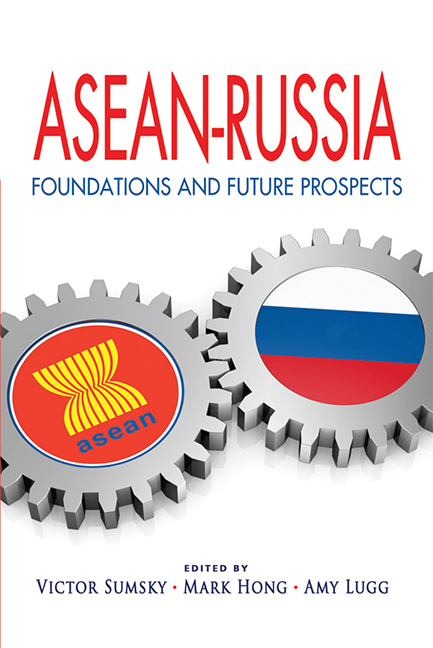Book contents
- Frontmatter
- Contents
- Foreword
- Preface
- About the Contributors
- Keynote Address
- Opening Remarks
- Keynote Address
- Introduction: Russia and the ASEAN Member States: Political and Economic Cooperation in Progress
- SECTION I WISEMEN'S VIEWS
- SECTION II GEOPOLITICS
- SECTION III BILATERAL RELATIONS
- SECTION IV Business and Economics
- SECTION V CULTURE AND EDUCATION
- EPILOGUE
- Index
Introduction: Russia and the ASEAN Member States: Political and Economic Cooperation in Progress
Published online by Cambridge University Press: 21 October 2015
- Frontmatter
- Contents
- Foreword
- Preface
- About the Contributors
- Keynote Address
- Opening Remarks
- Keynote Address
- Introduction: Russia and the ASEAN Member States: Political and Economic Cooperation in Progress
- SECTION I WISEMEN'S VIEWS
- SECTION II GEOPOLITICS
- SECTION III BILATERAL RELATIONS
- SECTION IV Business and Economics
- SECTION V CULTURE AND EDUCATION
- EPILOGUE
- Index
Summary
Introduction
This paper examines Russia's engagement with the Association of Southeast Asian Nations (ASEAN) and its member states. The paper will start with a background account of Russia's pro-Western foreign policy during the 1990s. This is to enable readers to understand the evolution of Russia's foreign policy from the time of independence in 1991 under President Boris Yeltsin and how it contrasted with the pragmatic foreign policy implemented by his successor, Vladimir Putin and thereafter by Dmitry Medvedev.
This account will be followed by an overview of Russia's foreign policy today at the international level and with the Asian region. It will be pointed out that in contrast to the early days when Russia struggled in its attempts to court the West and “Westernize” itself, Russia is today doing very well on the world stage, having adopted a more open, flexible, and balanced foreign policy approach. This is especially apparent in the context of the ASEAN-Russia relationship. It is acknowledged that the political and legal basis for ASEAN-Russia cooperation has developed considerably in recent years. It will then be pointed out that although economic ties between Russia and the ASEAN bloc is presently limited, there are clear areas of growth opportunities, based on the collaborations and deals that are already underway.
The author will then give some thoughts on the way forward for ASEAN-Russia collaboration. It will be argued that in order to further solidify this growing relationship and move from symbolic to substantive cooperation, the next step would be to develop greater economic linkages.
- Type
- Chapter
- Information
- ASEAN-RussiaFoundations and Future Prospects, pp. li - lxPublisher: ISEAS–Yusof Ishak InstitutePrint publication year: 2012

